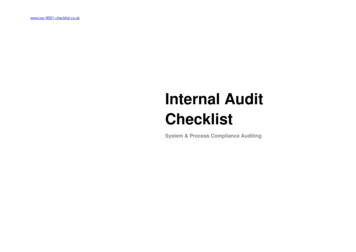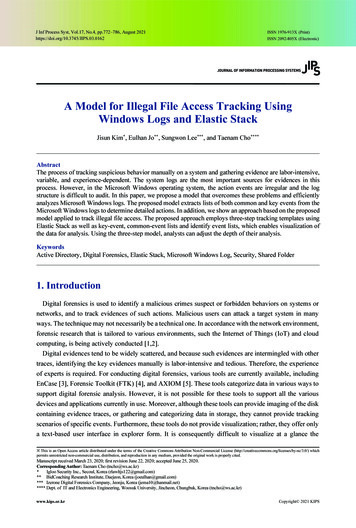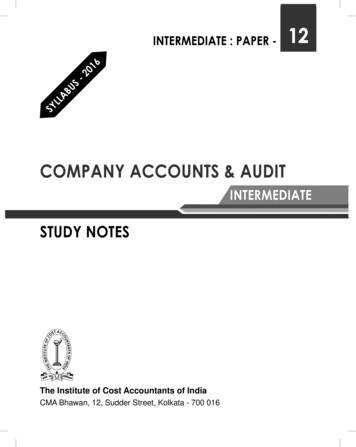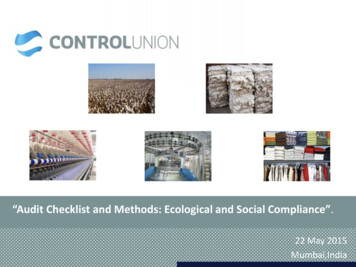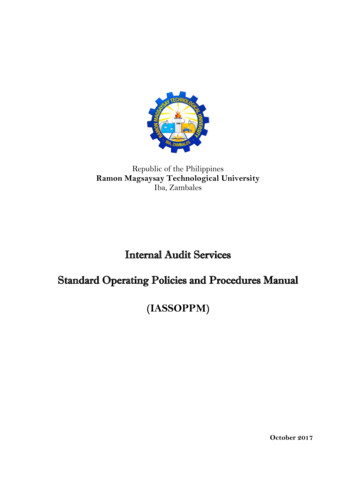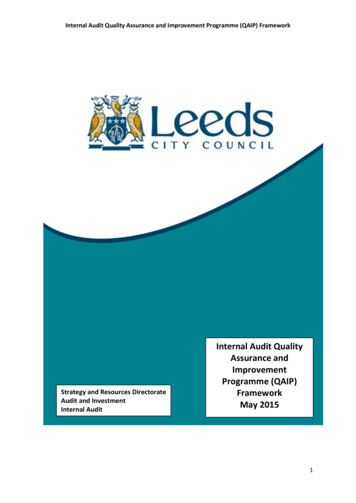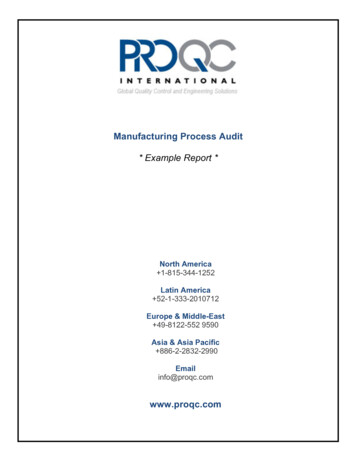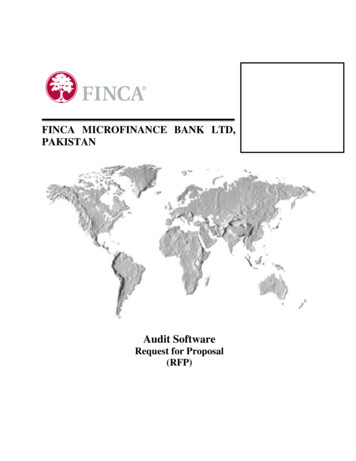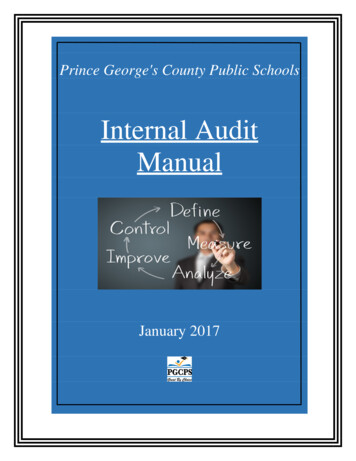
Transcription
Prince George's County Public SchoolsInternal AuditManualJanuary 2017
Table of ContentsI.Foreword .Pg. 6II.Definition of Internal Auditing .Pg. 6III.Benefits of an Internal Audit .Pg. 6Section A – Internal Audit Organization Pg. 7A1.Authority . .Pg. 7A1.1 Mission StatementA1.2 Executive Endorsement of Internal Audit CharterA2.Department Standards .Pg. 7A2.1 Institute of Internal Auditors IPPF and Generally AcceptedGovernment Auditing StandardsA2.2 Ethics & Code of ConductA2.3 Rules of ConductA3.Department Structure .Pg. 10A3.1 PGCPS Organizational ChartA3.2 Internal Audit Department Organization ChartA4.Position Responsibilities . Pg. 10A4.1 Director, Internal AuditA4.2 Supervisor, Internal AuditA4.3 Internal AuditorA4.4 Investigative AuditorA4.5 Information Systems Technology AuditorA4.6 Business AnalystA4.7 Lead Property Audit TechnicianA4.8 Property Audit TechniciansA5.Internal Audit Office Policies and Procedures Pg. 14A5.1 Internal Audit Contact InformationA5.2 Recruitment and Selection of StaffA5.3 ProbationA5.4 Termination of EmploymentA5.5 Employee EvaluationsA5.6 Training and Continuing EducationA5.7 CompensationA5.8 AttendanceA5.9 Leave and Absence PolicyA5.10 Disciplinary Action2
A5.11 GrievancesA5.12 SafetyA5.13 Employee OrganizationsSection B – Audit Procedures and Techniques for Student Activity Fund andOperational Audits .Pg. 18B1.Introduction .Pg. 18B2.Auditing Procedures . .Pg. 18B2.1 Auditor AssignmentB2.2 Statement of IndependenceB2.3 Planning BudgetB2.4 Engagement LetterB2.5 In-Office ReviewB2.6 Entrance ConferenceB2.7 Risk AssessmentB2.8 Audit ProgramB2.9 Audit Fieldwork and TestsB2.10 Working Papers – Purpose, Organization and FormatB2.11 Audit FindingsB2.12 Exit ConferenceB2.13 Supervisory ReviewB2.14 Quality Control / MonitoringB2.15 ThreatsB3.Audit Report .Pg. 30B3.1 Audit Report OrganizationB3.2 Audit Report ReviewB3.3 Audit Report FilingB3.4 Audit Report NumberingB3.5 Audit Report ReferencingB3.6 Management ResponseB3.7 Internal Audit Report TrackingSection C – Audit Procedures and Techniques for Special InvestigationAudits . . .Pg. 33C1.C2.C3.C4.C5.C6.C7.IntroductionApplication of Investigation StandardsIdentification of Circumstances Requiring Special InvestigationsAudit Techniques for Special Investigative AuditsPGCPS Compliance HotlineEvidence GatheringInvestigation Audit Reporting3
Section D – Audit Procedures and Techniques for Information Systems TechnologyAudits Pg. 38D1.D2.D3.D4.IntroductionIdentification of Audit AreasAuditing ProceduresAudit ReportsSection E – Audit Procedures and Techniques for Property Audits Pg. entification of Audit AreasAudit PlanningAudit ProceduresAudit ReportsSection F – Ancillary Activities .Pg. 404
Attachment IndexAttachment 1Board Policy 8373, Internal Board OperationsAttachment 2PGCPS Organizational ChartAttachment 3Internal Audit Department Organizational ChartAttachment 4Statement of IndependenceAttachment 5Sample Finding SheetAttachment 6SAF Audit ProgramAttachment 6.1Auditee Action PlanAttachment 6.2Year to Date Financial ReportAttachment 6.3Insolvency ReportAttachment 6.4Audit Workpaper Review Notes TemplateAttachment 6.5General Internal Control QuestionnaireAttachment 6.5.1Fraud Risk Assessment QuestionnaireAttachment 6.6Cash Receipts QuestionnaireAttachment 6.7Cash Disbursements QuestionnaireAttachment 6.8Clubs/Organizations and Vending Control QuestionnaireAttachment 6.9Sample Bank ReconciliationAttachment 6.10Cash Receipts Test TemplateAttachment 6.11Cash Disbursements Test TemplateAttachment 6.12Voided Checks Test TemplateAttachment 6.13Cancelled Checks Test TemplateAttachment 6.14Before and After School Learning Program Test TemplatesAttachment 6.15Risk Assessment Tool for Audit SelectionAttachment 6.16Assessment Tool for Independence Threat to Non Audit Services5
I.ForewordThe Internal Audit function is essential in the conduct of successful operations of thePrince George’s County Public School (PGCPS) system. It serves to examine andevaluate financial, administrative and operational activities. The function assists indetecting and preventing fraud, evaluating internal control, and monitoring compliancewith the school district’s policy and government regulations. Consequently, managementis provided with information to assist in their administration of resources for the effectiveoperation of PGCPS.This policy addresses Internal Audit’s functional relationship with PGCPS’ Board ofEducation as well as its administrative relationship with PGCPS’ management in effectingindependence throughout the audit process. This policy also sets forth the guidelines bywhich the internal audit function will be carried on.Internal Audit responsibilities will be performed consistent with the InternationalProfessional Practice Framework and Generally Accepted Government AuditingStandards. Auditors are required to adhere to the attribute standards (attributes oforganizations and individuals performing internal audit services), performance standards(the nature of internal audit services and provide quality criteria against which theperformance of these services can be measured) and implementation standards (expandsupon attribute and performance standards) as well as the strongly recommendedguidance.II.Definition of Internal AuditingThe Institute of Internal Auditors provides the following definition of Internal Auditing:“Internal Auditing is an independent, objective assurance and consulting activity designedto add value and improve an organization’s operations. It helps an organizationaccomplish its objectives by bringing a systemic, disciplined approach to evaluate andimprove the effectiveness of risk management, controls and governance processes.”III.Benefits of an Internal AuditThe Internal Audit function provides value to an organization. Some of the mostsignificant benefits include but are not limited to the following: Identification of deviations from management's policies and procedures andexpectations Evaluation of internal controls to help ensure management’s assets are protectedfrom loss, misuse, and abuse Objective assessment of areas of interest to management Confirmation that controls and procedures are adequate6
Recognized improvements to accounting controls to prevent and detect fraud,waste and abuse Identification of productivity enhancements Recoveries of unbilled or under-billed revenues and duplicate payments Recoveries of vendor overcharges Recognized opportunities to automate procedures Assurance of automated computer controls Audits all schools, offices, departments, programs, grants and special requests Identification of efficiencies including best practices, cost savings and costavoidancesSECTION A - INTERNAL AUDIT ORGANIZATIONA1.AuthorityA1.1 Mission Statement and Internal Audit CharterInternal Audit’s mission is to support the school system’s Board of Directors andmanagement in the effective discharge of their responsibilities. To this end,Internal Audit will furnish them with findings, analysis, recommendations,advisory services and information concerning the relevant activities with the goalof adding value and improving the school system’s operations. Internal Audit shallevaluate the school system's controls to determine whether they are designed toprotect its assets and to facilitate the preparation of fair and reliable reports tomanagement. Ultimately, Internal Audit will assist the school system withaccomplishing its objectives by bringing a systematic, disciplined approach toevaluate and improve the effectiveness of risk management, controls andgovernance processes.A1.2 Executive Endorsement of Internal Audit CharterInternal Audit’s authority and responsibilities have been endorsed by the PGCPSBoard of Education through Board Policy 8373, Internal Board Operations, Officeof Internal Audit. (Attachment 1)A2.Department StandardsA2.1 Institute of Internal Auditor’s International Professional PracticesFramework (IPPF) and Generally Accepted Government Auditing Standards(GAGAS)7
The department’s audits are performed based on specific auditing standards. Theterm “audit standards” means the rules or principles established for determining thelevel of quality for audit work performed. Audit standards are intended to definethe basis for consistent, reliable, high quality, professional audit results. InternalAudit responsibilities are consistent with the Institute of Internal Auditor’sInternational Professional Practices Framework and Generally AcceptedGovernment Auditing Standards which provide a structure for conducting highquality consulting and attestation engagements with competency, integrity,objectivity and independence.A2.2 Ethics and Code of Conduct (GAS, Ethical Principles 1.10 and 1.11and IPPF)Auditing is vital to PGCPS’ accountability to the public. Therefore, internalauditors are expected to conduct their work in accordance with the requiredstandards and to apply and uphold the following ethical principles:i. Integrity – Internal auditors are expected to avoid any compromise ofprofessional value for personal gain. The integrity of internal auditorsestablishes trust and thus provides the basis for reliance on their judgment.ii. Objectivity - Internal auditors are required to exhibit the highest level ofprofessional objectivity in gathering, evaluating and communicatinginformation about the activity or process being examined. Internal auditorsmake a balanced assessment of all the relevant circumstances and are notunduly influenced by their own interests or by others in forming judgments.iii. Confidentiality - Internal auditors respect the value and ownership ofinformation they receive and do not disclose information withoutappropriate authority unless there is a legal or professional obligation todo so.iv. Competency - Internal auditors apply the knowledge, skills andexperience needed in the performance of internal audit services.v. Professional Behavior – High expectations for the auditing professioninclude compliance with all relevant legal, regulatory and professionalobligations and avoidance of any conduct that might discredit the auditor’swork.vi. Public Interest – Public interest is referred to as the collective well-beingof the community of people and entities served by auditors. By adheringto the aforementioned code of ethics in performing their responsibilities,auditors are honoring the public trust.8
A2.3Rules of Conduct for PGCPS’ Internal AuditorsInternal Audit demonstrates compliance with ethical principles and a code of conduct byadhering to the following rules:1. Integrity - Internal auditors:1.1.1.2.1.3.1.4.Shall perform their work with honesty, diligence, andresponsibility.Shall observe the law and make disclosures expected by thelaw and the profession.Shall not knowingly be a party to any illegal activity, orengage in acts that are discreditable to the profession ofinternal auditing or to the organization.Shall respect and contribute to the legitimate and ethicalobjectives of the organization.2. Objectivity - Internal auditors:2.1.2.2.2.3.Shall not participate in any activity or relationship that mayimpair or be presumed to impair their unbiased assessment.This participation includes those activities or relationshipsthat may be in conflict with the interests of theorganization.Shall not accept anything that may impair or be presumedto impair their professional judgment.Shall disclose all material facts known to them that, if notdisclosed, may distort the reporting of activities underreview.3. Confidentiality - Internal auditors:3.1.3.2.Shall be prudent in the use and protection of informationacquired in the course of their duties.Shall not use information for any personal gain or in anymanner that would be contrary to the law or detrimental tothe legitimate and ethical objectives of the organization.4. Competency - Internal auditors:4.1.4.2.4.3.Shall engage only in those services for which they have thenecessary knowledge, skills, and experience.Shall perform internal audit services in accordance with theIPPFShall continually improve their proficiency and theeffectiveness and quality of their services.9
5. The Public Interest – Internal Auditors:5.1.5.2.Shall accept responsibility to serve the public interest.Shall ensure that there is accountability for public resources.6. Professional Behavior – Internal Auditors:6.1.6.2.Shall comply with all relevant legal, regulatory, andprofessional obligations and avoid any conduct that mightbring discredit to their work.Shall put forth honest efforts in performing their duties andprofessional services in accordance with the relevanttechnical and professional standards.A3.Department StructureCurrently the Internal Audit Department is staffed with the Director of InternalAudit, Supervisor of Internal Audit, 7 Staff Internal Auditors, 1 InvestigativeAuditor, 1 Lead Property Auditor, 2 Property Audit Technicians, 1 InformationTechnology Auditor, and 1 Business Analyst. The Internal Audit Departmentreports functionally to the members of the Board of Education and administrativelyto the Chief Executive Officer. The Internal Audit staff has no direct authority orresponsibility for any of the activities reviewed or audited.A4.A3.1PGCPS Organizational Chart (Attachment 2)A3.2Internal Audit Department Organization Chart (Attachment 3)Position ResponsibilitiesA4.1Director, Internal Audit – Duties/ResponsibilitiesThe Director plans, coordinates, and directs the day to day activities of thedepartment by performing the following: Provides leadership direction to development and operations ofInternal Audit infrastructure, resources and projects. Directs and manages Internal Auditors in entity-wide and auditspecific risk assessments designed to provide value to PGCPS. Oversees the development and maintenance of an integratedentity-wide internal audit risk assessment approach anddatabase. Oversees fraud and other investigations conducted by theInvestigative Auditor and other Internal Auditors as assigned. Interacts regularly with executive staff to ensure significantbusiness risks are identified and addressed.10
A4.2Reports Internal Audit results and accomplishments to themembers of the Board of Education.Supervisor, Internal Audit – Duties/ResponsibilitiesThe Supervisor directs staff performance while conducting student activity fundsand operational audits of varying complexity and scope. Additionalresponsibilities include the following:A4.3 Convey audit status to the Internal Audit Director. Lead proactively audit planning efforts. Assists with defining internal audit project scope and approvaltimeframe. Execute individual audits for respective accounts. Develop audit procedures to assure proper fieldwork performedas per audit plan. Supervise staff and review performance. Coach auditors and facilitate to resolve issues with schools oroperating areas. Review audit work papers to assure clarity and well-organizeddocumentation. Ensures key controls are tested and all imperative risks areaddressed to determine that financial transactions comply withexisting laws, contracts, Board policies and acceptableaccounting principles. Formulate apt conclusions relative to adequate internal controlsand procedures on the basis of knowledge of operations andaudit work performance. Assigns staff auditors to conduct professional training programsfor school staff as needed. Performs back-up duties in the absence of the Director ofInternal Audit.Internal Auditor – Duties/ResponsibilitiesInternal Auditors plan and perform assigned audits and analyses of student activityfunds, operations and investigations. Additional responsibilities include thefollowing: Examination and evaluation of the financial processes and/orrecords of PGCPS to ensure that they are being operatedefficiently and economically and in compliance with BOEpolicies.11
A4.4 Preparation of audit findings and recommendations forcorrective action; Provision of advisory services, training and assistance to schoolstaff, etc.Investigative Auditor – Duties/ResponsibilitiesThe Investigative Auditor performs investigations and monitors the whistleblowerhotline. Additional responsibilities include the following:A4.5 Evaluates a variety of confidential issues including conductinginvestigations of fraud, waste, abuse, mismanagement,misappropriations, irregularities, allegations, etc. Reviews and reassesses and updates the Entity-wide RiskAssessment Performs internal compliance audits, school operational orfinancial audits and assists on special projects as directed by theDirector of Internal AuditInformation Systems Technology Auditor – Duties/ResponsibilitiesThe Information Systems Technology Auditor plans and performs assignedInformation Technology (IT) audits. Additional responsibilities include thefollowing: Handles a variety of confidential matters including: conductingaudits of departments and schools to determine the adequacy ofIT related internal controls in responding to risks of the system’stechnology network. In performing the responsibilities the ITAuditor reviews IT systems controls policies and procedures;assessing the degree of accomplishment of financial and ITobjectives and acceptable accounting and auditing principles. Monitors, educates, and provides information and analysis tomanagement on technology issues; reviews IT policies,procedures, and systems relating to information technology andrecommends improvements for increased quality and costeffectiveness. Assists and supports Internal, Investigative and PropertyAuditors with audit assignments that include an IT component.12
A4.6Business Analyst – Duties/ResponsibilitiesThe Business Analyst supports members of the Board of Education by reviewingand analyzing use of dedicated resources. Additional responsibilities include thefollowing:A4.7 Participates with Internal Audit for the Board in gathering data,analyzing information and providing related services directedtoward the compilation and evaluation of financial informationfor Board Members; Participates individually in complex analyses or projects and/oras a team member in more complex procedural and financialanalysis projects. This includes program budgeting systemdevelopment, payroll and accounting. Provides support to staff auditors by providing analyticalsupport and assisting with school audits as needed. Provides general support to the Director of Internal Audit andStaff.Lead Property Audit Technician – Duties/ResponsibilitiesUnder the leadership of the Director, the Lead Property Audit Technicianperforms the following responsibilities: Serves as the team leader and coordinates audits of largerfacilities. Provides oversight of property audit activities for ensuring thatgoals and objectives are met. Reviews the results of audits performed by property audittechnicians; ensures reporting reflects results of physical auditsperformed. Conducts investigations and prepares reports to managementupon request relative to alleged fraudulent activities involvingPGCPS’ property. Facilitates property inventories of BOE properties Evaluates the condition and adequacy of property to assist indetermining program requirements including utilization,maintenance and replacement. Obtains and analyzes justification for supplying property abovenormal allowances.13
A4.8 Conducts meeting with responsible management to addressinordinate property losses; prepares analysis reports forsubmission to the Director, Internal Audit. Assists in the planning, establishment and maintenance of thesystem of accountability and controls (Asset ManagementSystem) and recommends new and revised procedures. Provides training and communicated opportunities forcontinuing education to Property Audit Staff Maintains central inventory recordsProperty Audit Technician – Duties/ResponsibilitiesUnder the instruction of the Lead Property Audit Technician the PropertyAudit Technician:A.5 Performs responsible and specialized work in the operation ofproperty inventory, accountability and control system Conducts fixed asset audits of Board of Education property(schools and offices). Conducts audits of fixed assets to confirm that inventory controlprocedures are maintained.Internal Audit Office Policies and ProceduresSignificant policies and procedures that are pertinent within the Internal AuditOffice are as follows:A5.1Contact Information - The Internal Audit Office can becontacted as follows:Internal Audit DepartmentSasscer Administration Building14201 School Lane Upper Marlboro, MD 20772(301) 780-6888The office hours of operation are 8:30 am through 5:00 pmMonday - FridayA5.2Recruitment and Selection of Staff - Internal Audit staff areselected based upon Board of Education policies that requirethat application be submitted in response to advertisedopenings. The screening process may involve interviews andwritten tests when deemed necessary. Promotions are made inthe same manner.14
A5.3Probation – Newly hired staff will be subject to aprobationary period that is determined by Human Resources athire. Normally this period is 6 months. Staff will beconsidered permanent employees at the end of this periodunless otherwise informed.A5.4Termination of Employment - Staff are able to submitresignation within Oracle HR module. However, as aprofessional courtesy, it is requested that the Internal AuditDirector is notified personally at least 14 calendar days prior toresignation. Involuntary terminations are conducted at thedirection of Human Resources.Employees failing to report to work for 3 consecutive workdays without authorized leave are subject to termination. Theemployee may be reinstated only in the event that it isdetermined that extenuating circumstances prevented contactwith Internal Audit Director.A5.5Employee Evaluations – Human Resources requires thatemployees are evaluated annually. Staff evaluations areperformed by the Internal Audit Supervisor for staff auditors.All other staff members are evaluated by the Internal AuditDirector.A5.6Training and Continuing Education - GAGAS require thatstaff conducting and managing audits earn 80 hours continuingeducation biannually, 24 of which must be directly related togovernment auditing. IPPF Attribute Standard 1230 alsorequires internal auditors to enhance their skills, knowledgeand other competencies through continuing professionaldevelopment by completing a minimum of 40 CPEs annually.Staff are required to personally make arrangements to ensurethat this requirement is met. Training opportunities includingconferences, webinars, online courses, training manuals andinternal training opportunities may be offered to assist in thiseffort.A5.7Compensation - Staff compensation is determined by HumanResources upon hire.Although pay increases may berecommended during the staff evaluation process, the InternalAudit Director does not have authority to enforce payment.A5.8Attendance – Staff are expected to be available duringbusiness hours conducting Internal Audit assignments unlesson authorized leave. Staff must work a minimum of 8 hoursdaily. However, assigned responsibilities may extend beyondthe normal work day and work week. Each staff is entitled to a15
duty-free lunch period of at least 30 minutes. The lunch periodmay be coordinated and determined by the Internal AuditDirector. Internal Audit does not recognize a telecommutingpolicy as it has not been established by the Board ofEducation.A5.9Leave and Absence Policy - Internal Audit staff earn annualand sick leave days that may be approved for use at thediscretion of the Internal Audit Director. Staff must bemindful of responsibilities and assignments when requestingleave. The Internal Audit Director will approve time off whileconsidering these factors. Approval of leave time does equateto an extension of time for completion of tasks. Staff will beexpected to reach predetermined deadlines unless the Directorhas agreed to an extension. Staff should not considersubmission of a leave request as an automatic entitlement totake time off even though they have available leave balance.Managerial approval is an essential component of the leavemanagement process.Annual Leave: Internal Auditors are required to submitrequests for annual leave using Oracle Time and Attendance.These requests are required to be submitted at least 2 workdays before the date of the requested leave. Annual leaverequests submitted less than 2 work days is subject to denialand should be avoided. This is especially the case with sameday leave requests. Staff should appropriately plan forabsences. Unplanned annual leave should be requested on alimited basis and approval will be considered by the Directordependent on circumstances.Internal Audit staff is required to communicate verbally to theInternal Audit Director their intent to request annual leaveprior to submission in Oracle. Internal Audit staff shouldensure that leave requested has been approved before it istaken. Leave taken that has not been approved will beconsidered LWOP. Annual leave will not be granted thatexceeds the amount of the employee’s earned leave.Sick Leave: Internal Auditors may request sick leave to beused in advance or as unplanned leave.Sick leave that is unplanned must be called in prior to theemployee’s scheduled arrival time. The call must be placed tothe Internal Audit Director, Supervisor or Business Analyst. Ifneither is available, a voicemail should be left for the Director.An email should also be sent to the employee’s supervisor16
whenever the employee has knowledge that the Director is onleave.Sick leave extending past 3 days requires a signed physician’sdocument. This document must be presented on the date theemployee returns to work. Failure to present this documentwill result in the extended leave being considered LWOP.Sick leave exceeding 10 days must be requested throughAbsence Management.Internal Audit Calendar: All approved leave must be enteredon the shared Internal Audit calendar. The Business Analyst orDirector will enter called-in leave on the calendar.A5.10Disciplinary Action: Internal Audit staff are required to followdepartment standards including professional ethics and code ofconduct as described in Section A2. Staff members are alsosubject to the professional requirements set forth by PGCPS forall employees. Reasons for disciplinary action that couldpotentially result in termination include but are not limited tothe following: Incompetence or other unsatisfactory performance Insubordination Unauthorized absence Violation of administrative regulation and departmentrules Excessive tardiness Acceptance of gratuities Abuse or theft of PGCPS’ property Any conduct that reflects unfavorably on PGCPS and theInternal Audit DepartmentA5.11Grievances: Staff with complaints or grievances should firstattempt to resolve the issue with their immediate supervisor. Ifthe matter cannot be settled at that level, the issue should beescalated to the Internal Audit Director and finally to theappropriate Human Resources official if the matter remainsunsettled. The Internal Audit staff is not represented bycollective bargaining units.A5.12Safety: Staff are responsible for observing and maintainingsafety measures in the area of their assignment. Unsafe conditionsshould be reported to supervisory staff at once to help ensure the17
condition is corrected. Internal Audit staff are provided secureaccess to the Internal Audit office facility. It is each employee’sresponsibility to safeguard access codes, keys, and combinationsprovided. Staff are also responsible for securing access toequipment such as laptops that have been provided for conductingaudit tasks.A5.13Employee Organizations: Staff are encouraged to joinprofessional organizations that enhance knowledge and job skills.Specifically Internal Audit staff is encouraged to join the Instituteof Internal Auditors, Association of Local Government Auditorsand the Association of Certified Fraud Examiners. The InternalAudit Office will fund the cost of memberships at the discretion ofthe Internal Audit Director.SECTION B - AUDIT PROCEDURES AND TECHNIQUES FOR STUDENTACTIVITY FUND AND OPERATIONAL AUDITSB1.IntroductionThis portion of the manual prescribes policies and procedures to be used inthe performance of an internal audit from the point it is assigned until theaudit report is issued. The Audit Director is primarily responsible for allphases described herein, including review of staff auditor fieldwork. Staffauditors work under the direction of the Audit Director, who approves allaudit programs, work files and audit reports. The Audit Director isresponsible for oversight of work performed by the entire Internal Auditstaff.The Director of Internal Audit develops an annual audit plan that lists theactivities to be audited and the estimated hours for completion. Mattersconsidered in establishing audit priorities are generally established using arisk analysis model. This model uses various criteria to evaluate functionswithin the school system that pose the greatest risk to the Board ofEducation. Requests from the Board of Education as well as the CEO arealso considered in development of the audit plan.B2.Auditing ProceduresThe following are basic steps for conducting an internal audit:B2.1Auditor Assignment – Staff auditors are required to submitquarterly projections of schools to be audited with their quarterlyreports. Projections are performed by auditors based semi-annualrisk assessments.18
B2.2Statement of Independence – Each member of the audit staff
Internal Audit responsibilities the International will be performed consistent with Professional Practice Framework and Generally Accepted Government Auditing Standards. Auditors are required to adhere to the attribute standards (attributes of organizations and individuals performing internal audit services), performance standards (the nature of internal audit services and provide quality .
